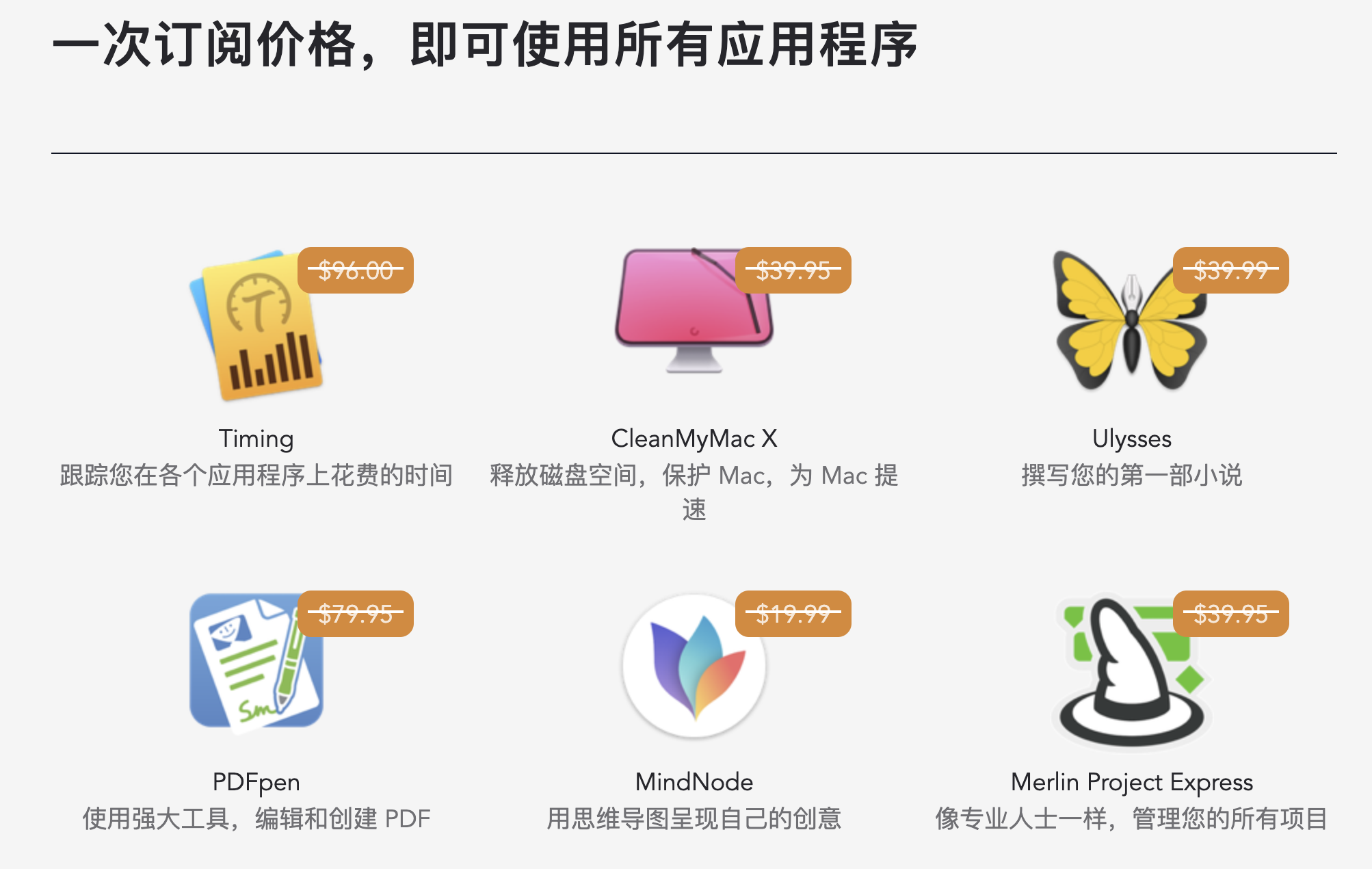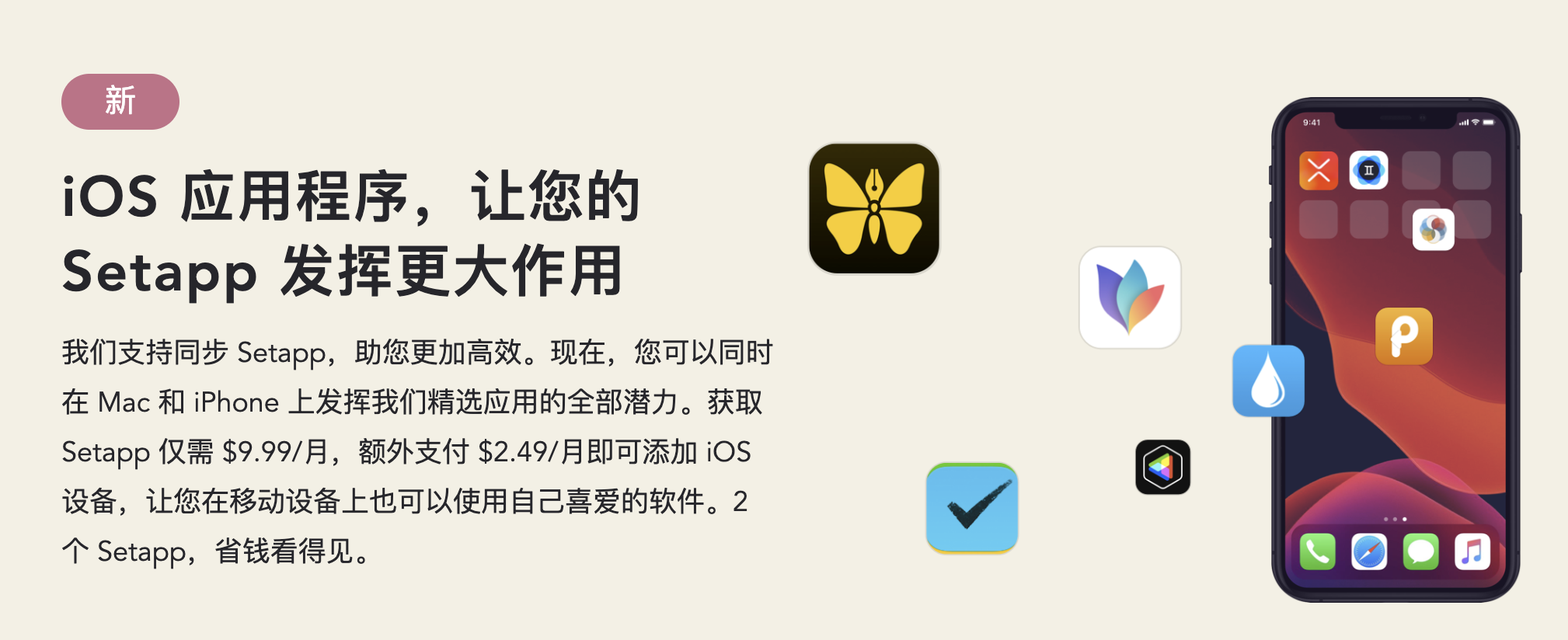This company created an 'app store” for iOS
In response to the new regulations of the European Union’s Digital Market Act, Apple announced on January 25 that it would open iOS application sideloading to 27 countries and regions in the European Union.
Apple’s new policy will be officially implemented in March this year. This major change means that third-party app stores other than the App Store will be allowed to appear on the iOS platform. This is an unprecedented change for Apple.
Recently, the software company MacPaw announced that it will expand its Setapp service to mobile operating systems in the European market. In other words, MacPaw plans to create the first third-party app store on the iOS platform. For ordinary users, they are one step closer to being able to install apps on iOS devices through channels other than the App Store.
#How is the Setapp service implemented on Mac?
The Setapp service under MacPaw is no stranger to many Mac users. MacPaw was originally a small company that developed software for Mac, as can be seen from its brand name. However, MacPaw quickly expanded the new business Setapp. Specifically, Setapp will package a large number of Mac third-party software, and users can obtain the right to use these software by paying a monthly subscription fee.
For users, the Setapp service has two main advantages. First of all, MacPaw will screen and review the software selected by Setapp to ensure that the software passes the quality standard, does not contain ads, and has an excellent experience. In other words, Setapp's software library is equivalent to MacPaw's "strict selection". Currently, the Setapp service includes more than 200 software, focusing on efficiency and tools, such as the well-known Markdown editor Ulysses, mind mapping software MindNode, etc.

(Source: Setapp)
Secondly, Setapp has certain price advantage. Setapp subscription price is $9.99 per month, which doesn’t seem cheap. However, the price of software on Mac is generally on the high side, starting at tens of dollars. Ulysses costs almost 40 US dollars, and MindNode costs about 20 US dollars. For experienced users who use Mac for office work and creation, it is a good deal to be able to use a considerable number of productivity tools for $9.99.
#Setapp can achieve price advantage mainly through its negotiation and cooperation with software developers. The Mac application ecosystem cannot be said to be absolutely rich. There are many small and medium-sized developers, and there are very few companies that can truly have a large number of users and achieve monopoly in some fields. Therefore, Setapp can maintain a certain bargaining power and achieve a win-win situation for MacPaw, developers and users.
Moreover, unlike iOS, macOS is not an absolutely closed platform. Application installation channels outside the App Store have always existed, and developers can also use this to circumvent Introduce apple tax.
#What will be different about the iOS version of Setapp?
In fact, before Apple officially announced the opening of iOS sideloading, MacPaw had already tried to launch the Setapp service for iOS. On the iOS platform, users who have paid on the Mac side can first download and install the iOS application included in the Setapp software library through the App Store, and then unlock the paid functions according to the method provided by MacPaw. In this way, MacPaw bypasses the Apple payment method in the App Store and avoids an Apple tax. At the same time, users can use the corresponding applications normally at a low price.
# However, this method is a bit tortuous, the experience is still not good enough, and there is a risk of being blocked by Apple. Moreover, so far, there are only about a dozen iOS applications in the Setapp software library, which is difficult to meet everyone's needs. It should be noted that there is an additional monthly fee of $2.49 to use the iOS app in Setapp.

(Source: Setapp)
But now with Apple After the sideloading seal of the iOS platform in the EU is lifted, Setapp can openly transform into a third-party application market that can be installed on iPhones and iPads. In other words, European iPhone users will soon be able to use third-party app stores on their phones as happily as Android users.
Of course, judging from the content of Apple’s previous press releases, the third-party app store on iOS is in some details different from the Android app store we are familiar with. , Coolan market is still different.

(Source: Kuan)
First of all, the third party Apps in the App Store will undergo virus scanning and basic manual review by the notarization system launched by Apple. In other words, these applications that are not listed through the App Store will also be reviewed, but the review intensity will be weaker.
#Secondly, developers who create third-party app stores must provide Apple with a 1 million euro letter of credit. This is not a high threshold for MacPaw to launch a Setapp store.
In addition, even if the application is distributed through a third-party app store, after the first installation exceeds 1 million times, Apple will pay a core technology fee of 0.5 euros each time. .
Xiao Lei personally speculates that after the Setapp app store is launched on iOS, the initial applications will most likely be efficiency and tool-based, continuing the previous successful experience on the Mac side. If the early response is good, Setapp is expected to gradually expand the type and number of applications to attract more users. As for the payment model of the Setapp app store, Xiao Lei believes that MacPaw may adopt a hybrid model of subscription and buyout, which can meet the different needs of more people.
So, is it possible for Setapp and other third-party app stores to compete with the App Store in the future? Xiao Lei thinks it is difficult.
Apple is extremely reluctant to open iOS sideloading in the EU, entirely to cope with the Digital Market Act. In the statement released by Apple, it repeatedly revealed its dissatisfaction with this regulation. Moreover, it can also be seen from the above analysis that although Apple allows third-party app stores to go online, it still imposes many restrictions.
#For example, if an application is downloaded more than 1 million times, the developer will have to pay a core technology fee. Moreover, Apple has also reduced the EU App Store’s commission ratio, which is only 10% for small and medium developers and 17% for large developers. If third-party app stores want to be more attractive, they have to offer a lower commission ratio. Low commission income With the suppression of technology fee costs, it is very difficult for third-party application stores to rise.
#How can Chinese users use the iOS version of “App Store”?
As mentioned before, Apple has opened iOS sideloading in the EU entirely for compliance. In other parts of the world, Apple still clings to closed iOS. In other words, Chinese users cannot experience third-party app stores on iOS in a conventional way. So, what about unconventional ways?
We all know that when the same model of iPhone is sold in different regions around the world, some functions and features may differ due to local regulations and policies. .
For example, the Japanese version of the iPhone will force a sound when taking a photo, and the Chinese version of the iPhone cannot use the FaceTime voice call function. Moreover, these restrictions are achieved through hardware means, and users cannot lift the restrictions even if they log in to an external Apple ID or switch overseas mobile phone SIM cards.

The above is the detailed content of This company created an 'app store” for iOS. For more information, please follow other related articles on the PHP Chinese website!

Hot AI Tools

Undresser.AI Undress
AI-powered app for creating realistic nude photos

AI Clothes Remover
Online AI tool for removing clothes from photos.

Undress AI Tool
Undress images for free

Clothoff.io
AI clothes remover

AI Hentai Generator
Generate AI Hentai for free.

Hot Article

Hot Tools

Notepad++7.3.1
Easy-to-use and free code editor

SublimeText3 Chinese version
Chinese version, very easy to use

Zend Studio 13.0.1
Powerful PHP integrated development environment

Dreamweaver CS6
Visual web development tools

SublimeText3 Mac version
God-level code editing software (SublimeText3)

Hot Topics
 1371
1371
 52
52
 deepseek ios version download and installation tutorial
Feb 19, 2025 pm 04:00 PM
deepseek ios version download and installation tutorial
Feb 19, 2025 pm 04:00 PM
DeepSeek Smart AI Tool Download and Installation Guide (Apple Users) DeepSeek is a powerful AI tool. This article will guide Apple users how to download and install it. 1. Download and install steps: Open the AppStore app store and enter "DeepSeek" in the search bar. Carefully check the application name and developer information to ensure the correct version is downloaded. Click the "Get" button on the application details page. The first download may require AppleID password verification. After the download is completed, you can open it directly. 2. Registration process: Find the login/registration portal in the DeepSeek application. It is recommended to register with a mobile phone number. Enter your mobile phone number and receive the verification code. Check the user agreement,
 Why can't the Bybit exchange link be directly downloaded and installed?
Feb 21, 2025 pm 10:57 PM
Why can't the Bybit exchange link be directly downloaded and installed?
Feb 21, 2025 pm 10:57 PM
Why can’t the Bybit exchange link be directly downloaded and installed? Bybit is a cryptocurrency exchange that provides trading services to users. The exchange's mobile apps cannot be downloaded directly through AppStore or GooglePlay for the following reasons: 1. App Store policy restricts Apple and Google from having strict requirements on the types of applications allowed in the app store. Cryptocurrency exchange applications often do not meet these requirements because they involve financial services and require specific regulations and security standards. 2. Laws and regulations Compliance In many countries, activities related to cryptocurrency transactions are regulated or restricted. To comply with these regulations, Bybit Application can only be used through official websites or other authorized channels
 Sesame Open Door Trading Platform Download Mobile Version Gateio Trading Platform Download Address
Feb 28, 2025 am 10:51 AM
Sesame Open Door Trading Platform Download Mobile Version Gateio Trading Platform Download Address
Feb 28, 2025 am 10:51 AM
It is crucial to choose a formal channel to download the app and ensure the safety of your account.
 Anbi app official download v2.96.2 latest version installation Anbi official Android version
Mar 04, 2025 pm 01:06 PM
Anbi app official download v2.96.2 latest version installation Anbi official Android version
Mar 04, 2025 pm 01:06 PM
Binance App official installation steps: Android needs to visit the official website to find the download link, choose the Android version to download and install; iOS search for "Binance" on the App Store. All should pay attention to the agreement through official channels.
 Download link of Ouyi iOS version installation package
Feb 21, 2025 pm 07:42 PM
Download link of Ouyi iOS version installation package
Feb 21, 2025 pm 07:42 PM
Ouyi is a world-leading cryptocurrency exchange with its official iOS app that provides users with a convenient and secure digital asset management experience. Users can download the Ouyi iOS version installation package for free through the download link provided in this article, and enjoy the following main functions: Convenient trading platform: Users can easily buy and sell hundreds of cryptocurrencies on the Ouyi iOS app, including Bitcoin and Ethereum. and Dogecoin. Safe and reliable storage: Ouyi adopts advanced security technology to provide users with safe and reliable digital asset storage. 2FA, biometric authentication and other security measures ensure that user assets are not infringed. Real-time market data: Ouyi iOS app provides real-time market data and charts, allowing users to grasp encryption at any time
 gate.io sesame door download Chinese tutorial
Feb 28, 2025 am 10:54 AM
gate.io sesame door download Chinese tutorial
Feb 28, 2025 am 10:54 AM
This article will guide you in detail how to access the official website of Gate.io, switch Chinese language, register or log in to your account, as well as optional mobile app download and use procedures, helping you easily get started with the Gate.io exchange. For more tutorials on using Gate.io in Chinese, please continue reading.
 How to find the download link of Ouyi okx Android and Apple
Feb 21, 2025 pm 05:39 PM
How to find the download link of Ouyi okx Android and Apple
Feb 21, 2025 pm 05:39 PM
Ouyi OKX is a world-leading cryptocurrency exchange that provides users with a safe and convenient trading experience. Users can download Ouyi OKX's mobile apps, including Android and Apple versions through official channels.
 How to solve the problem of 'Undefined array key 'sign'' error when calling Alipay EasySDK using PHP?
Mar 31, 2025 pm 11:51 PM
How to solve the problem of 'Undefined array key 'sign'' error when calling Alipay EasySDK using PHP?
Mar 31, 2025 pm 11:51 PM
Problem Description When calling Alipay EasySDK using PHP, after filling in the parameters according to the official code, an error message was reported during operation: "Undefined...




